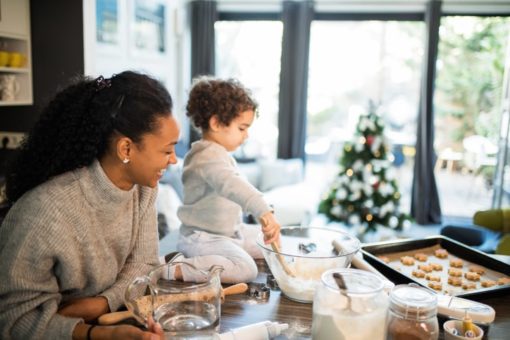Updated on 12/05/23
The holidays can be exciting, especially for children. Presents, desserts, decorations, Christmas, Hanukkah, Kwanzaa, and all kinds of holiday traditions can bring sparkles to a child’s life, regardless of their age. However, many children experience a sense of loss, sadness or isolation during the holidays, particularly if they have a history of trauma or are separated from their family (along with everything that has happened with COVID-19). The holidays can also be a time for comparison among social classes, which can be difficult for children who come from families who cannot afford to buy new presents or decorations. This can potentially lead to feelings of unworthiness and even be a trigger for bullying. As adults, it is our job to teach our children to always be kind to others, especially around the holidays. We must teach our kids that many do not have family or friends to spend this time, and this season can elicit many sad feelings. We also must be courteous of our children’s anxiety and this time of year.
Mental Health Tips for Parenting Your Child During the Holidays
- Don’t feel pressured to over-spend on gifts: Set a strict budget for gift buying and make some of your gifts at home. It is essential not to give your child everything he/she asks for and to teach your child that the holidays are not about gifts but are instead about spending time with loved ones.
- Participate in a family-friendly volunteer opportunity: Volunteering can teach your child the importance of giving and expressing gratitude. This can be done by donating food to a local food bank or volunteering at a local animal shelter.
- Teach your children about giving: Giving gifts can be even better than receiving gifts. This may be buying a toy to donate to a charity or making a gift for a friend at school.
- Enjoy spending time together as a family: Spend time decorating the tree, building gingerbread houses, sledding, singing holiday songs, learning new recipes, and creating arts and crafts. Take advantage of non-class days to spend quality time with them.
- Keep your household routines the same: The American Academy of Pediatrics notes that “changes in family routines can cause stress for children, and it recommends that parents stick to their child’s sleep and mealtime schedules as closely as possible during the busy holiday season.”
- Be mindful of your child’s anxiety during family gatherings: Whether or not you plan to travel away for the holidays, be considerate about your child’s struggle with socialization. Greeting relatives can trigger feelings of anxiety and stress. Talk to your children about each day’s agenda and give them details on the events and your expectations, such as your length of stay and locating a quiet place where your child can relax. If your child does become overwhelmed, try talking with them privately, allowing them to take a break in a safe place, or leaving the event altogether.
Make Your Child’s Season Bright
It’s been a challenging year but with the holidays now here, hopefully your child can find some aspects of it to enjoy. Most of that starts with your support of their mental well-being. Of course, if your child continues to struggle and needs extra help, Discovery Mood & Anxiety Program is open all season to offer the support they need well before the new year begins.
Kristen Fuller, M.D., is a clinical content writer and enjoys writing about evidence-based topics in the cutting-edge world of mental health and addiction medicine. She is a family medicine physician and author, who also teaches and contributes to medicine board education. Her passion lies within educating the public on preventable diseases, including mental health disorders and the stigma associated with them. She is also an outdoor activist and spends most of her free time empowering other women to get outside into the backcountry.
